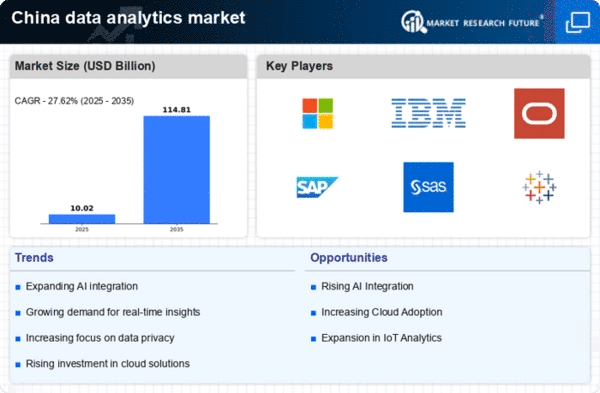Government Initiatives and Support
The Chinese government plays a pivotal role in fostering the growth of the data analytics market through various initiatives and support programs. Policies aimed at promoting digital transformation and innovation have led to increased funding for technology startups and research institutions focused on data analytics. For instance, the government has allocated substantial resources to develop smart city projects, which heavily rely on data analytics for urban planning and management. This support not only stimulates the data analytics market but also encourages collaboration between public and private sectors. As a result, the market is likely to witness accelerated growth, with an expected increase in the adoption of advanced analytics solutions across various industries. The government's commitment to enhancing data infrastructure further solidifies the foundation for a robust data analytics ecosystem.
Expansion of E-Commerce and Digital Services
The rapid expansion of e-commerce and digital services in China has a profound impact on the data analytics market. As online shopping and digital transactions proliferate, businesses are inundated with vast amounts of consumer data. This influx necessitates the use of advanced analytics to understand consumer behavior, optimize marketing strategies, and enhance customer experiences. The data analytics market is thus witnessing increased demand for analytics solutions that can process and analyze this data effectively. With e-commerce sales projected to reach over $2 trillion by 2025, the need for robust analytics capabilities is more critical than ever. Companies that harness the power of data analytics are likely to gain valuable insights, enabling them to tailor their offerings and improve customer satisfaction in an increasingly competitive landscape.
Advancements in Machine Learning Technologies
The data analytics market in China is significantly influenced by advancements in machine learning technologies, which enhance the capabilities of data analysis. These innovations enable organizations to process vast amounts of data more efficiently and derive actionable insights with greater accuracy. As machine learning algorithms become more sophisticated, businesses are increasingly adopting these technologies to improve predictive analytics and automate decision-making processes. The integration of machine learning into analytics platforms is expected to drive market growth, with estimates suggesting a potential increase in market size by over 30% in the coming years. This trend highlights the importance of continuous investment in research and development within the data analytics market, as companies strive to leverage cutting-edge technologies to stay ahead of the competition.
Rising Demand for Data-Driven Decision Making
The data analytics market in China experiences a notable surge in demand as organizations increasingly recognize the value of data-driven decision making. This trend is particularly evident in sectors such as finance, retail, and healthcare, where companies leverage analytics to enhance operational efficiency and customer engagement. According to recent estimates, the market is projected to grow at a CAGR of approximately 25% over the next five years. This growth is fueled by the need for businesses to adapt to rapidly changing market conditions and consumer preferences. As a result, investments in data analytics tools and technologies are becoming a priority for organizations aiming to maintain a competitive edge. The data analytics market is thus positioned to benefit from this shift towards data-centric strategies, leading to enhanced insights and improved business outcomes.
Growing Importance of Data Privacy Regulations
As the data analytics market in China expands, the significance of data privacy regulations becomes increasingly apparent. The implementation of laws such as the Personal Information Protection Law (PIPL) necessitates that organizations prioritize data security and compliance. This regulatory landscape compels businesses to invest in analytics solutions that not only provide insights but also ensure the protection of sensitive information. Consequently, the data analytics market is adapting to these requirements by developing tools that incorporate privacy-by-design principles. This shift may lead to a more responsible approach to data usage, fostering consumer trust and encouraging further investment in analytics capabilities. Organizations that proactively address these regulatory challenges are likely to gain a competitive advantage, positioning themselves favorably within the evolving data analytics landscape.
















